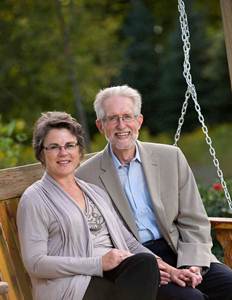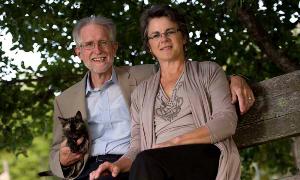A deep sense of community was instilled early in the lives of Dr. Brian Ewert and his wife, Kathleen Rulka.

Their families both put strong emphasis on giving and sharing. Dr. Ewert and Kathleen continue this tradition by being generous donors to Marshfield Clinic and the community.
Dr. Ewert, a nephrologist, was elected president of Marshfield Clinic in January 2012. His father was a hospital administrator and his mother an obstetrical nurse in Newton, Kansas, a community about the same size as Marshfield.
Kathleen is a marriage and family therapist and a clinical chaplain. She was raised in Fort Wayne, Indiana, one of seven children. Her father was a pharmacist and along with Kathleen's mother, owned a drug store and restaurant.
"Giving was part of the family culture in which I grew up," Dr. Ewert recalled. "Donating time and resources was an integral part of being a community member. Recognizing that we all have a responsibility to be good stewards of the resources we have received was instilled at an early age."
Dr. Ewert recalled a family tradition of taking freshly baked pies to families who had lost loved ones. "Supporting each other was just what we did in a small community, a part of our family culture," he explained.
Kathleen also remembers seeing charitable giving as a child.
"One of the most powerful memories I have of my father took place in his drug store, which had a restaurant attached," she recalled. "A man had lost his job after an injury and couldn't pay for his prescriptions. My father provided the medications at no cost, then took him into the restaurant and gave him food for his family."
Another example of how her father made an impact in their community came near the end of her dad's life when she was visiting him in the hospital. A woman stopped by his room and told him, "You helped save my baby's life. You gave me formula when I didn't have any to give her."
Kathleen also recalled hearing about her mother's parents, who took in three orphaned children. Asked how he'd feed them when he already had 10 children of his own, her grandfather said, "I'll just put more plates on the table."
"Seeing generosity in your parents and grandparents engenders giving and touching the lives of others," she said.
Dr. Ewert started giving to Marshfield Clinic in 1995, during the first capital campaign for the Laird Center for Medical Research. Kathleen and Dr. Ewert's giving then expanded to include steady contributions through automatic payroll deductions to the Angel Fund, which provides funding for non-medical needs of patients facing serious illnesses or dealing with difficult life situations or emergencies.

Since he became president, they have increased their support for research and education, which together with patient care, are the three pillars of the Clinic's mission. They strive to personally attend philanthropic and community events to demonstrate their support.
"We are grateful that our philanthropy is helping to make positive change for all of the people we are honored to serve," he said.
"Dr. Ewert and Kathleen lead by example with their philanthropic support of the Clinic and community," said Teri Wilczek, chief development officer. "They are dedicated to helping patients and neighbors in need."
Associated with becoming president of the Clinic, his nephrology practice, which focuses on kidney disease and hypertension, has been reduced. However, his 25 years of patient care provide the grounding for remaining mindful of the needs of those served by Marshfield Clinic.
Kathleen is also an artist, creating works of pottery and sculpture. "Right now I'm fully invested in the Empty Bowls project, which supports Soup or Socks, the food pantry in Marshfield." She hopes to have 700 bowls completed for the event in March. She is collaborating with many others in the community, some of whom are just being introduced to clay.
Dr. Ewert and Kathleen share a love of gardening. At their rural home west of Marshfield, they have an apple orchard, a grape arbor and garden beds where they grow most of the vegetables they eat throughout the year. They enjoy canning and pickling. Excess produce is donated to Soup or Socks and others in the community.
A rather unique feature of their landscaping is a labyrinth. It was constructed by Dr. Ewert along with family and friends, for his first wife, Sharon. She completed her life in 2003 after a seven year journey with breast cancer.
"Sharon was interested in meditative practices, and one of those was walking a labyrinth," he explained. The labyrinth at the Ewert-Rulka home is about 50 feet in diameter, fashioned after a labyrinth at the Chartre cathedral in France. Unlike a maze, a labyrinth is a singular path with a destination. The path follows from the outside edge to the structure's center and serves as a place for meditation and reflection.
The peaceful surroundings of their home and the lifestyle Dr. Ewert and Kathleen have created provide for balance and reflection as the challenges of health care leadership are addressed.
"Health care has become too expensive for people in the United States," he said. "We are tasked to find mechanisms to contain those costs while maintaining quality and an optimum patient experience. This involves change, which can represent opportunity and creativity for some, but suffering and loss for others.
"We are in the midst of a transition to a completely different payment model; the new model will reward healthcare providers for keeping people healthy rather than only paying for treatment once patients are sick. This is a deep structural change from a business model that worked well for 90 years. Marshfield Clinic has been at the forefront of innovation for almost a century, and we will successfully meet this new challenge as well."
Dr. Ewert has enormous respect for the work ethic and dedication of the Clinic's physician and non-physician staff. Standing at the window of his office looking out at the main entrance of the Marshfield Center provides moments to reflect on the organization he leads.
"I notice the numbers of handicapped vans and patients coming and going," he said. "It's a continual stream of people in all stages of health coming through the door, about 5,000 every day throughout the Marshfield Clinic system. That's a good reminder of what this place is all about."
